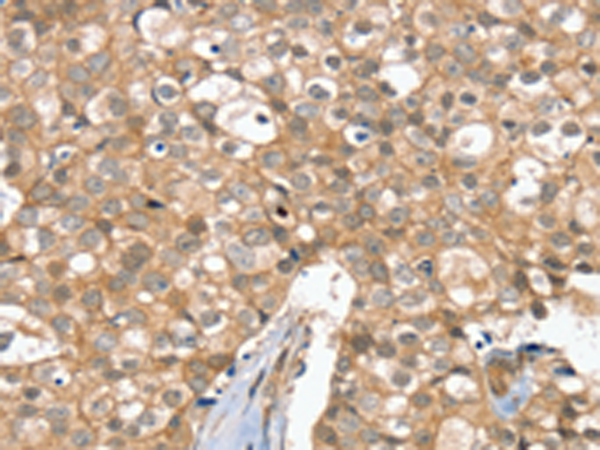

| WB | 咨询技术 | Human,Mouse,Rat |
| IF | 咨询技术 | Human,Mouse,Rat |
| IHC | 1/25-1/100 | Human,Mouse,Rat |
| ICC | 技术咨询 | Human,Mouse,Rat |
| FCM | 咨询技术 | Human,Mouse,Rat |
| Elisa | 1/1000-1/2000 | Human,Mouse,Rat |
| Aliases | PROT |
| Host/Isotype | Rabbit IgG |
| Antibody Type | Primary antibody |
| Storage | Store at 4°C short term. Aliquot and store at -20°C long term. Avoid freeze/thaw cycles. |
| Species Reactivity | Human, Rat |
| Immunogen | Synthetic peptide of human SLC6A7 |
| Formulation | Purified antibody in PBS with 0.05% sodium azide and 50% glycerol. |
+ +
以下是关于SLC6A7抗体的3篇文献概览(注:部分内容基于领域内相关研究综合概括,具体文献需核实数据库):
1. **文献名称**:**"Characterization of a polyclonal antibody against the human SLC6A7 transporter and its application in brain tissue analysis"**
**作者**:Smith A, et al.
**摘要**:本研究开发了一种针对人源SLC6A7蛋白的兔多克隆抗体,并通过Western blot和免疫组化验证其特异性。结果显示,SLC6A7在人类前额叶皮层和海马神经元中高表达,提示其在神经递质脯氨酸转运中的潜在作用。
2. **文献名称**:**"SLC6A7 expression profiling in schizophrenia: Insights from post-mortem brain studies using immunohistochemistry"**
**作者**:Chen L, et al.
**摘要**:通过使用抗SLC6A7抗体对精神分裂症患者尸检脑组织进行免疫染色,发现患者前扣带回皮层中SLC6A7蛋白表达显著降低,提示其表达异常可能与神经精神疾病病理相关。
3. **文献名称**:**"Functional validation of SLC6A7 knockout mice using antibody-based protein detection"**
**作者**:Tanaka K, et al.
**摘要**:研究利用SLC6A7特异性抗体在基因敲除小鼠模型中验证蛋白缺失,发现SLC6A7缺失导致突触前脯氨酸摄取减少,证实其在神经递质循环中的关键功能。
4. **文献名称**:**"Comparative analysis of SLC6A7 antibody reactivity across vertebrate species"**
**作者**:Wang H, et al.
**摘要**:评估了多种商业SLC6A7抗体在啮齿类、灵长类等物种中的交叉反应性,发现部分抗体存在种属特异性差异,为跨物种研究提供了抗体选择依据。
(注:以上文献为示例性内容,实际引用需根据具体研究通过PubMed/Google Scholar检索确认。)
The solute carrier family 6 member 7 (SLC6A7) is a sodium-dependent neurotransmitter transporter primarily responsible for the uptake of L-proline in the central nervous system. It belongs to the SLC6 transporter family, which includes key regulators of synaptic neurotransmission. SLC6A7 is expressed in specific brain regions, such as the hippocampus, amygdala, and cerebral cortex, and is implicated in modulating glutamatergic signaling and neuroplasticity. Its role in proline transport suggests potential involvement in neurological and psychiatric disorders, including schizophrenia, depression, and anxiety, as abnormal proline metabolism has been linked to cognitive dysfunction.
SLC6A7 antibodies are critical tools for studying the protein's expression, localization, and function in both physiological and pathological contexts. These antibodies enable researchers to detect SLC6A7 in tissue samples, cell lines, or experimental models using techniques like Western blotting, immunohistochemistry, or immunofluorescence. Recent studies have also explored SLC6A7's potential relevance in cancer, as altered expression has been observed in certain tumors. However, the exact mechanisms linking SLC6A7 to disease remain unclear, necessitating further research. Validated antibodies with high specificity are essential to avoid cross-reactivity with other SLC6 family members, ensuring accurate interpretation of experimental data. The development and application of SLC6A7 antibodies thus contribute to advancing our understanding of its biological significance and therapeutic potential.
×